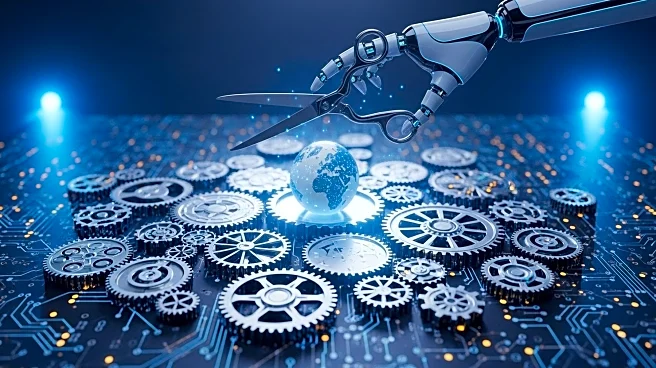What is the story about?
What's Happening?
The global job market is undergoing significant changes as artificial intelligence (AI) becomes increasingly integrated into business operations. Major companies such as Accenture, Tata Consultancy Services (TCS), Microsoft, Meta, Intel, Amazon, Google, and Panasonic are implementing substantial workforce reductions. Accenture has laid off 11,000 employees, while TCS has reduced its workforce by approximately 12,000, with reports suggesting the number could be as high as 30,000. Microsoft and Meta are also cutting thousands of jobs, focusing on AI innovation and efficiency. Panasonic is shifting its focus to AI, biometrics, and energy storage technologies, resulting in 10,000 job cuts.
Why It's Important?
These layoffs highlight the transformative impact of AI on the workforce, as companies prioritize automation and AI-driven solutions to enhance efficiency and competitiveness. The shift towards AI is reshaping industries, prompting employees to adapt by acquiring new skills to remain relevant. This trend signifies a broader economic and social transformation, where the balance between human labor and machine intelligence is rapidly evolving. The widespread job cuts underscore the urgency for workers to reskill and adapt to an AI-centric future.
What's Next?
As AI continues to redefine business operations, companies are likely to further streamline their workforce, focusing on AI-driven strategies. Employees will need to embrace reskilling opportunities to align with the changing demands of the job market. The ongoing integration of AI may lead to more job cuts, but it also presents opportunities for innovation and growth in new sectors. Stakeholders, including political leaders and industry experts, may need to address the societal implications of these changes, ensuring support for affected workers.
Beyond the Headlines
The ethical and cultural dimensions of AI-driven job cuts are significant, as they raise questions about the future of work and the role of human labor in an increasingly automated world. The rapid adoption of AI technologies may lead to long-term shifts in employment patterns, necessitating new policies and frameworks to support workers in transition. The balance between technological advancement and social responsibility will be crucial in navigating these changes.















